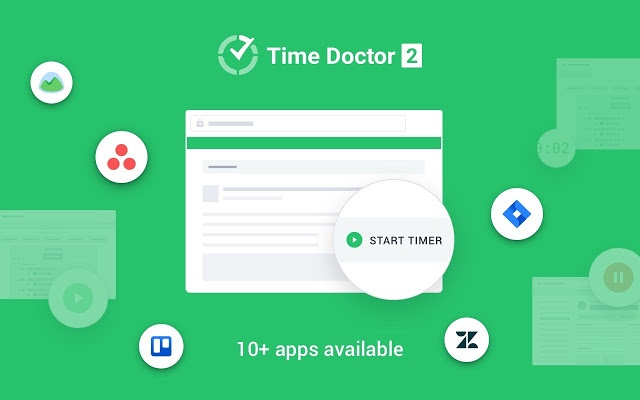Time truly is money for businesses. Good time management is a set of skills you and your team can build up to get more done without raising your stress level.
Wondering how you can improve your time management in the workplace?
In this article, we’ll give you nine rock-solid time management tips and explain three amazing benefits you’ll see if you use them.
This article contains:
(click on a link to directly read that section)
- 9 actionable tips to improve time management in the workplace
- 3 reasons why time management in the workplace is important
Let’s get started.
9 actionable tips to improve time management in the workplace
Effective time management is all about developing good habits that promote productivity and help you avoid time-wasters.
Here are nine time management tips to help you and your team use work hours efficiently:
1. Set SMART goals
You can’t ace time management unless you and your employees first know what you’re working towards. That’s why setting goals is important work.
Consider setting goals for your workday as well as for longer periods.
To work more efficiently, it’s best to break the process down into phases and set a goal for each one. And for that, you can use the SMART method to set goals that are achievable.
SMART goals are:
- Specific: Knowing exactly what you’re working towards.
- Measurable: Having a way to measure your progress.
- Achievable: Setting practical goals based on past performance.
- Relevant: Ensuring the goal is important and has real benefits.
- Time-bound: Setting a deadline for your goal.
2. Organize your work life
It’s hard to feel productive when your workspace and schedule are messy. Fortunately, staying organized can help reduce your team’s stress levels.
Here are a few things you can practice and encourage your employees to do to feel more organized:
A. Clean up your workspace
A messy environment can contribute to poor time management and stress.
A 2018 study by Springer Link showed that people are more prone to procrastination when they feel overwhelmed by clutter.
Places that tend to get messy include your:
- Physical or digital filing system.
- Email inbox.
- Work desk.
Clutter crowds your work and makes it less accessible. Tidying up your physical and digital workspace can improve your workflow and help you be more productive.
Start or end each day by stacking books, deleting unwanted files, and adding something you like to your workspace.
B. Use a calendar
It’s best not to rely on your memory to stay on top of your tasks. You can use a calendar to keep track of important due dates, meetings, and goals.
Digital calendars can also allow you and your team to access schedules from anywhere and set up notifications.
C. Check your email intermittently
Checking your email is inevitable but also a distraction.
Your workflow may be interrupted if you drop what you’re doing every time you get an email. Instead, you can schedule time once or twice daily to read and respond to emails.
D. Make a to-do list
Before diving into your work, try to list out all your tasks for the day. You can break larger jobs into smaller tasks.
It’s also helpful to group similar tasks and do them in one time block. For example, you can group tasks that:
- Take place in one location.
- Share one set of materials.
- Require the same kind of effort or process.
Time blocking similar tasks in this manner can help limit the amount of time spent shifting gears from one task to another.
At the end of the day, you can audit your time and move some items to the next day’s to-do list. This time management tip works best when you make to-do lists a daily task.
3. Prioritize your tasks
Once you have your tasks listed out, you’ll need to prioritize tasks using an Eisenhower matrix. This method organizes tasks by how urgent or important they are.
Under this method, you’ll label your tasks “urgent” or “important. An urgent task has a deadline and needs to be dealt with immediately. An important task will have a large impact on your goals or those of the business.
You can divide your tasks into four clear categories:
| Urgent | Not Urgent | |
| Important | Do It Now Tasks with clear deadlines and consequences | Schedule It Tasks without a set deadline but will help you achieve your overall goals |
| Not Important | Delegate It Tasks that don’t necessarily require your specific skills or intervention | Delete It Distractions that only make you feel good in the short term |
Managers and business leaders can reference this ranking when delegating tasks.
4. Avoid multitasking
Have you ever checked your phone while watching a movie, then realized you missed out on 10 minutes of the plot?
Not everyone is great at multitasking. This is why it’s better to encourage employees to focus on a specific task before moving to the next.
Multitasking can be unproductive in many ways. A 2019 study in the European Research Studies Journal found that multitasking increased the time required to complete the tasks by 15%.
5. Take scheduled breaks
It’s odd to think of an employee’s time off as productive. However, this 2021 research by North Carolina State University shows that taking regular breaks is a performance and focus booster.
That said, it may not be best to take breaks on a whim. Instead, you can encourage your team to schedule breaks and work towards them.
It can also be helpful to distance oneself from work to eat, stretch, have a chat, even check social media, etc.

6. Keep meetings purposeful
Poorly planned meetings can be time-wasters in business. Sometimes, meetings are unnecessary or lack structure.
Time spent in unproductive meetings can be converted into salary hours. The 2019 state of meetings report by Doodle claimed that $399 billion are wasted on poorly organized meetings in the US each year.
Additionally, we know that the Covid-induced rise in remote work has increased the number of virtual meetings.
Research by ReclaimAI in 2021 indicates that the average professional now spends 21.5 hours a week in meetings, compared to 14.2 hours a week in February 2020.
To save on time wasted during a meeting, you can:
- Ask yourself if you can handle some talking points over email, instant messaging, or a phone call.
- Figure out what you need to achieve in the meeting, create an agenda, and share it with your team members.
- Look out for anything during the meeting that may be a distraction from your goals.
7. Try a time management strategy
There is no one recipe for managing time. Your team may need to try a few strategies to combat poor time management. Here are two examples:
A. The Pomodoro technique
Use a timer to measure blocks of work time and regular breaks with the Pomodoro technique.
The technique recommends working on a task for 25 minutes and then taking a 5-minute break. You could then repeat this four times and then take a longer break for 30 minutes.
You can adjust these time periods in whatever way suits you. Include longer stretches of work and longer breaks, or repeat the cycle as many times as you’d like.
Use apps like Tomato Timer, Focus To-Do, and Focus Plant for the Pomodoro time management technique.
B. The ALPEN method
This time management technique recommends you start your workday with the following routine:
- Activities and tasks: Create a complete to-do list.
- Length of time: Estimate how much time the individual tasks will take.
- Plan for buffering: Add in some time to cover breaks and potential obstacles.
- Establishing priorities: Prioritize tasks that are most important and decide which can be done another day.
- Note-taking: Evaluate how your day went and take some notes on how to improve it.
8. Practice your good habits
Once you understand how to improve your time management skills, you and your team need to keep practicing good time spending habits.
Some tips include:
- Keep in mind what you can gain from good habits.
- Be consistent and use reminders to prompt you.
- Notice what triggers your bad habits and practice different responses.
- Keep track of your performance and reward yourself for progress.
- Do a daily time audit to check up on your time management.
With some time management training, you’ll notice improvements over time.
9. Use time tracking software
The key to effective time management is understanding where and how you’re currently spending your own time. It’s also crucial to analyze your team’s productivity levels.
Our final time management tip is to use time tracking software, like Time Doctor, to understand how you spend your work hours — down to the second.

Time Doctor is a powerful employee productivity management software. It’s used for tracking time by major companies, like Verizon and Ericsson, as well as by small businesses, such as Thrive Market.
Time Doctor’s great productivity monitoring and project management features can help you and your team build good time management skills.
How?
Whether your team works in an office or does remote work, Time Doctor can help you keep track of:
- How many hours each employee has worked.
- Use other productivity reports, such as projects and tasks, timeline, activity summary, and hours tracked.
- Productivity ratings to classify websites and applications as either productive or unproductive.
- The dashboard to get easy-to-read summary reports of the time spent on each project, client, and task.
- Employee productivity across apps using Time Doctor’s powerful Chrome browser extension.
Check out the complete list of Time Doctor’s features for more details.
Using the time tracking information, you can do a daily, weekly, and monthly time audit. It can help your team strengthen their time management strategy.
We have now explored some time management tips you can use in your workplace.
But what exactly is the importance of time management?
We’ll cover that in the next section.
3 reasons why time management in the workplace is important
Possessing good time management skills could unlock three important benefits:
1. Increased productivity
Good time management lets you get quality work done with less time and stress.
Time management skills include planning, choosing what to focus on, eliminating distractions, and optimizing how you use your energy. Effective time management skills also make decision-making faster and easier.
With better time management, your team can:
- Prioritize tasks and get important work done.
- Limit your procrastination.
- Aim to never miss a deadline.
- Deliver high-quality work.
- Get more done by the end of the day.
2. Better work-life balance
Time management is an essential part of a good work-life balance.
Poor time management can cause employees to feel a lot of stress about their work, even after work hours.
When the boundary between work life and personal life is blurred, employees may feel like they can’t enjoy their off-time. This can have a negative effect on their mental health. High workplace stress can also cause an employee to experience burnout.
On the other hand, better time management can positively affect an employee’s personal life. They may have enough time to do things they enjoy, like hobbies and exercise and seeing friends and family.
You can expect your team to experience less stress and feel more well-rested.
3. Improved team productivity
It’s important to remember that employees alone aren’t responsible for their own time. Management skills play an important role too.
If you, as a manager, can harness the power of good time management, you can help your team members be more productive. Managers have the responsibility when delegating tasks to ensure they aren’t overworking their staff. But they also have the power to teach their employees time management techniques.
Our time management tips can also act as management tips. A good time management strategy, when taught and practiced in the workplace, can help everyone grow together as professionals.
Wrapping up
Effective time management doesn’t come naturally to most people. It’s a collection of skills and techniques one can master over time. When you practice good time management, you may start to see the benefits in your personal and professional life.
You can check out our tips for time management in the workplace as a starting point and see how they help you and your team.
To get started, why not try out Time Doctor’s 14-day free trial and gain insights into how you spend time?

Vaishali Badgujar is a Content and SEO specialist at Time Doctor, an employee-friendly time-tracking system that boosts productivity.


